|
|
|
Sort Order |
|
|
|
Items / Page
|
|
|
|
|
|
|
| Srl | Item |
| 1 |
ID:
134787
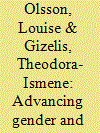

|
|
|
|
|
| Summary/Abstract |
Research on gender and peacekeeping has been revolving around two strands of questions. First, what form of peace does peacekeeping contribute to establishing? And second what are the gender dimensions of how peacekeeping is implemented? Subthemes underlying these questions are concerned with whether women's participation and gender aspects of security should be integral parts of the post-war society and the effectiveness of current gender mainstreaming and balancing policies. In this commentary we argue that there has been considerable progress in the field of gender and peacekeeping. Feminist research has raised questions about the understanding and conceptualisation of peace and security, while empirical research systematically explores the gender dimensions of peacekeeping. Yet, in order for research on gender and peacekeeping to progress, it needs to address issues such as theory underdevelopment, lack of data and continued exclusion from mainstream research. The commentary highlights as an area of particular concern the failure of existing research to find common ground and outlines opportunities of building bridges between empirical and feminist researchers.
|
|
|
|
|
|
|
|
|
|
|
|
|
|
|
|
| 2 |
ID:
167376
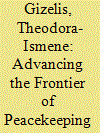

|
|
|
|
|
| Summary/Abstract |
The impact of United Nations (UN) peacekeeping on conflict has received a sustained amount of attention in the empirical literature. The advent of new data on UN peacekeeping and new temporal units of analysis have enabled researchers to expand the frontiers of peacekeeping research and undertake a more nuanced examination of peacekeeping effectiveness. In this special section, a series of articles examine how UN peacekeeping affects different types of violence within conflicts and leads to different types of peaceful outcomes. Factors such as the cultural affinity between peacekeepers and local communities, the size of peacekeeping operations and the specific composition of UN forces are shown to be important variables associated with lower levels of casualties and violence and also a higher likelihood of mediation and timely peaceful settlements in civil wars. In the aggregate, these articles suggest that robust peacekeeping is associated with better outcomes in many stages of conflict.
|
|
|
|
|
|
|
|
|
|
|
|
|
|
|
|
| 3 |
ID:
174762
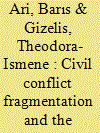

|
|
|
|
|
| Summary/Abstract |
While the extant literature has highlighted the importance of UN peacekeeping operations (PKOs) in addressing commitment problems in civil wars, actor fragmentation presents additional challenges for conflict resolution. A higher number of competing actors not only worsens coordination problems but also aggravates the risk of opposition to a peace process, generating an environment prone to spoiler violence. This article argues that UN interventions matter more when commitment and coordination problems are worse, which corresponds to known traits of fragmented conflicts. Using data on civil conflict duration and intensity, we present evidence that UN PKOs are effective at mitigating adverse impacts of fragmentation. Fragmented conflicts are both longer and deadlier when the UN is not involved to support a peace process, while UN peacekeeping mitigates the effects of fragmentation.
|
|
|
|
|
|
|
|
|
|
|
|
|
|
|
|
| 4 |
ID:
149498
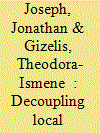

|
|
|
|
|
| Summary/Abstract |
Civil society organizations and grassroots groups are often unable to play an active role in post-conflict reconstruction and peacebuilding. A possible explanation for the observed challenges in peacebuilding is the gap or decoupling between international expectations and norms from practical action, local norms and capacities. External actors are often overly instrumental and operate according to a general template that fails to start from what the local capacities might actually be. This often leads to the decoupling of general values from practical action, which helps account for the observed barriers of engaging local civil and community organizations in reconstruction. We examine the different types of decoupling and the challenges these present. We evaluate our general theoretical argument using evidence based on the experiences of Liberian women’s civil society organizations. Given the compliance of the Liberian government with international norms, we should expect external actors to have an easier task in incorporating civil society and women’s organizations in the post-conflict reconstruction process; yet, the record appears to be the opposite. While we present the ‘tragic’ aspect of this relationship between international norms and local practice, we also suggest opportunities for ‘hybrid’ alternatives.
|
|
|
|
|
|
|
|
|
|
|
|
|
|
|
|
| 5 |
ID:
090137
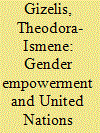

|
|
|
|
|
| Publication |
2009.
|
| Summary/Abstract |
Previous studies have suggested that societies where women have higher social and economic status and greater political representation are less likely to become involved in conflict. In this article, the author argues that the prospects for successful post-conflict peacebuilding under the auspices of the United Nations (UN) are generally better in societies where women have greater levels of empowerment. Women's status in a society reflects the existence of multiple social networks and domestic capacity not captured by purely economic measures of development such as GDP per capita. In societies where women have relatively higher status, women have more opportunities to express a voice in the peacemaking process and to elicit broader domestic participation in externally led peacekeeping operations. This higher level of participation in turn implies that UN Peacekeeping operations can tap into great social capital and have better prospects for success. An empirical analysis of post-conflict cases with a high risk of conflict recurrence shows that UN peacekeeping operations have been significantly more effective in societies in which women have relatively higher status. By contrast, UN peacekeeping operations in countries where women have comparatively lower social status are much less likely to succeed.
|
|
|
|
|
|
|
|
|
|
|
|
|
|
|
|
| 6 |
ID:
173769
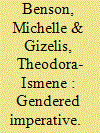

|
|
|
|
|
| Summary/Abstract |
There is increasing awareness that sexual violence is distinct from other aspects of civilian victimization in civil wars. Few studies have examined the independent impact of such violence on responses to civil wars as compared to “traditional” forms of violence. This article explores whether reports of high levels of rape and sexual violence increase the probability of United Nations (UN) attention to conflicts and calls to action. In so doing, we combine original data on UN Security Council (UNSC) resolutions with data on sexual violence in armed conflict and estimate the impact of sexual violence on UN attention to all civil wars from 1990 to 2009. We show that the effects of sexual violence on the number and level of UNSC resolutions are significant even when controlling for other important determinants of UN action. These findings have important implications for understanding how the UN has expanded its view on protecting civilians.
|
|
|
|
|
|
|
|
|
|
|
|
|
|
|
|
| 7 |
ID:
124980
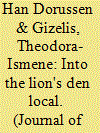

|
|
|
|
|
| Publication |
2013.
|
| Summary/Abstract |
Multidimensional peacekeeping has drawn the United Nations (UN) into state-building, and missions have taken on significant responsibilities for good governance. Since it aims at transforming states from fragile post-conflict situations into inclusive, well-governed societies, multidimensional peacekeeping is more complex and arguably also more contentious than traditional peacekeeping. Multidimensional peacekeeping affects the balance of power between the government and rebels and provides them with opportunities for rent-seeking. Although the potential gains are obvious, the process is bound to lead to uncertainty and controversy. Whereas the international community mainly appreciates the opportunity of comprehensive peacekeeping to create value, local actors may be more concerned with opportunities for claiming value. What will be the responses of local actors to peacekeeping given the likely impact on the distribution of power between rebels and governments and their uneven opportunities to benefit from collaborating? Using event data for post-Cold War UN peacekeeping missions in Africa, the analysis considers when peacekeeping elicits cooperation rather than conflict, focusing on (a) the authorities involved in the event, (b) the policies implemented, and (c) the role of the peacekeepers. Key findings are that government authorities are more likely to respond cooperatively to peacekeeping actions, while rebels are more likely to respond with hostility. Both the government and rebels are unlikely to contest policies that aim to strengthen state capacity, while both are more likely to contest human rights policies. Finally, rebels tend to respond more cooperatively when peacekeepers have a mainly supportive role.
|
|
|
|
|
|
|
|
|
|
|
|
|
|
|
|
| 8 |
ID:
119956
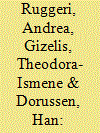

|
|
|
|
|
| Publication |
2013.
|
| Summary/Abstract |
How many peacekeepers are needed to keep the peace? Under what conditions are local governments and rebel forces more willing to cooperate with an intervention force? From a theoretical perspective in which the main role of peacekeepers is to assist local actors in overcoming their commitment problems and mistrust toward each other, it follows that sufficiently robust missions should positively affect levels of cooperation. Furthermore, any effect should be conditional on the local balance of power, that is, the military leverage between government and rebel forces. Relatively weak rebel groups-facing a stronger government-should be more willing to cooperate with larger missions. In the empirical analysis, using newly collected event data on United Nation (UN) peacekeeping operations from 1989 to 2005 in African civil wars, the authors find support for conditional effect of robust peacekeeping: there is more cooperation with UN peacekeepers when the rebels are weak.
|
|
|
|
|
|
|
|
|
|
|
|
|
|
|
|
| 9 |
ID:
166750
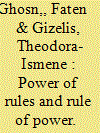

|
|
|
|
|
| Summary/Abstract |
The 2018 Presidential Theme for the International Studies Association’s Annual Conference was “Power of Rules and Rule of Power.” The theme underlines the importance of recognizing the relative and relational influence of power and rules in international politics. To do so, research should examine official rules but also probe what role informal rules play in shaping formal regulations of international interactions and power dynamics. The nexus of actors, issues, and interactions define international relations as a research field but also impact international studies as a profession. The articles included in this special issue and the forum expand, question, and problematize such interactions.
|
|
|
|
|
|
|
|
|
|
|
|
|
|
|
|
| 10 |
ID:
178684
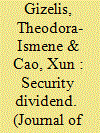

|
|
|
|
|
| Summary/Abstract |
United Nations Security Council Resolution 1325 highlights the distinct needs of women in security and well-being. Few studies explore how peacekeeping affects women’s access to health and education. Yet, women’s access to public services such as health is a form of gender inequality in post-conflict countries leading to unbalanced distribution of resources. We argue that peacekeeping operations (PKOs) have both a direct and an important indirect impact on maternal health and women’s well-being. First, peacekeeping can have a direct effect by providing medical and training facilities. Second, peacekeeping has an indirect effect as improvement in the overall level of security facilitates women’s access to medical services and education. We evaluate our argument by combining evidence from different levels of analysis. First, we use a difference-in-difference analysis of 45 African countries with data between 1990 and 2013, comparing the changes in maternal mortality rates (MMR) for countries with and without PKOs. Second, we look at within-country variations across areas with and without UN peacekeeping deployment in three countries with integrative PKOs, combining geo-coded peacekeeping data with individual data on maternal health and education from the Demographic and Health Surveys (DHS) in the Democratic Republic of Congo, Côte D’Ivoire, and Liberia. We find strong empirical support for a positive relationship between peacekeeping presence and maternal health outcomes and access to services.
|
|
|
|
|
|
|
|
|
|
|
|
|
|
|
|
| 11 |
ID:
067246
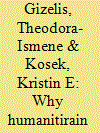

|
|
|
| 12 |
ID:
152331
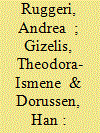

|
|
|
|
|
| Summary/Abstract |
It remains contested whether peacekeeping works. The impact of peacekeepers’ actions at the local subnational level for overall mission success has lately received critical attention. Local peacekeeping is expected to matter because it reassures local actors, deters resumption of armed hostilities, coerces parties to halt fighting, and makes commitment to agreements credible. Thus peacekeepers affect the relations between central and local elites and avoid the emergence of local power vacuums and areas of lawlessness. This study uses new subnational data on the deployment of United Nations peacekeepers. It uses matching and recursive bivariate probit models with exogenous variables for temporal and spatial variation to deal with possible nonrandom assignment of the treatment. We demonstrate that conflict episodes last for shorter periods when peacekeepers are deployed to conflict-prone locations inside a country, even with comparatively modest deployment. The effect of peacekeeping on the onset of local conflict is, however, less clear cut.
|
|
|
|
|
|
|
|
|
|
|
|
|
|
|
|
|
|
|
|
|